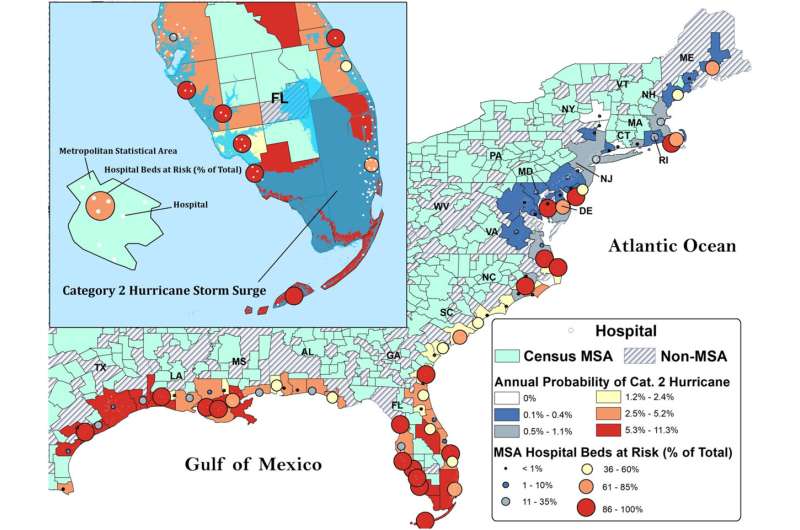
Even relatively weak storms pose a serious flood risk to hospitals along the coast, according to a study.
The Center for Climate, Health, and the Global Environment at Harvard T.H. Chan School of Public Health published a study today that shows the effects of climate change on the likelihood of hospital flooding.
The interim director of Harvard Chan C-CHANGE said that they now have a better sense of which hospitals are likely to flood from a storm.
Climate change may cause hurricanes to hit regions further north than in the past. We can avoid crises that other hospitals have had to endure in places like my hometown of Boston by learning from their experience. Disaster strikes before we act.
About 1 in 4 Americans are covered by the 668 acute care hospitals in 78 metropolitan statistical areas located within 10 miles of the Atlantic and Gulf Coast. Half or more of the metro areas have hospitals that are at risk of flooding from a Category 2 storm.
There are 10 metro areas where access to hospital care is at risk due to a Category 2 Hurricane.
The Baton Rouge, Virginia Beach, Corpus Christi, Philadelphia, and Boston metro areas have seen an increase in the number of beds at risk of flooding due to sea level rise.
Hospitals have been devastated by recent storms. The study found that even if the roads around the hospital buildings are not flooded, it may still be difficult to get to care. Half of the roads in 18 metro areas were at risk of flooding from a Category 2 storm. During hurricanes and storms after they have passed, flooded roads can be a challenge to get to the hospital.
The model for how coastal hospitals and health systems can improve their resilience to hurricanes is provided by the Southeast Louisiana Veterans Health Care Center.
It was designed to remain operational for seven days even if city utilities and infrastructure are compromised and features back-up fuel supplies, on-site sewage treatment facilities, and sufficient accommodations for up to 1000 staff and patients. Critical mechanical and electrical equipment as well as patient care areas are located above the 100 year flood.
The Harvard Chan C-CHANGE's Climate program helps identify, support, and prepare health care workers to address climate related impacts on health and health care delivery. The program protects people most at risk from the climate crisis and helps health care providers buffer risks to their patients.
More information: A. T. Tarabochia‐Gast et al, Flood Risk to Hospitals on the United States Atlantic and Gulf Coasts From Hurricanes and Sea Level Rise, GeoHealth (2022). DOI: 10.1029/2022GH000651